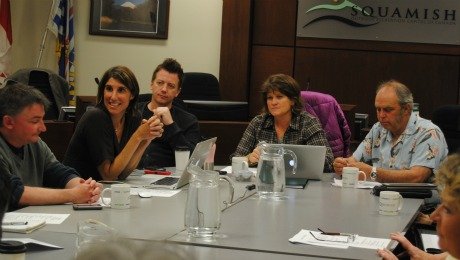
Councillor Patricia Heintzman says this year’s tax rate can’t be seen in isolation. Its antecdents, she says, are in the past council decisions to spend money using reserves and accumulated surplus. She also voiced optimistic about the future, saying there are ‘tons’ of enquiries about developmnt in Squamish.
Q, What is your view on the tax rates?
A, I think we need to take a more critical view and get closer to six or seven percent, 12 per cent is just unacceptable and 15 per cent for business is unacceptable. I think it was a shock for some councilors.
Woodfibre paid for 1.8 million in taxes, so if Woodfibre was still here, we could have had a zero increase, but we simply don’t have any heavy industry.
Q, What would be a reasonable tax rate?
A. Well, given our circumstances, I think it would be reasonable to be in that 6-7 per cent level and I think it’s achievable.
I mean we run a fairy lean ship, and people always think that government is bloated but you have to stay competitive, or you won’t get the caliber of people you need to get. You have to make sure the union staff and the exempt staff and union staff wages are increasing at the same time.
Union wages are all based on what is negotiated in the last agreement, so if the city of Vancouver agrees to 3 to 4 per cent over three years, and the City of Surrey agrees to something else, by the time it comes to us, everything is predetermined.
Q, So, where can we find some efficiencies?
A. We will have to make some tough decisions, we will have to do with what we have instead of adding more staff, so let’s say we don’t cut the grass as much so our summer maintenance might be diminished…
Q, How did we get to this year’s high taxation?
A. If we don’t do anything to our existing services, you are looking at 6 per cent right off the bat, and these are things that are inevitable, salaries, and RCMP costs.
The other thing, too, is you have to look at the history of the budget.
During the New Directions, I think it was three consecutive zero budgeting, and that isn’t necessarily a good thing, because they were spending a ton of money, so depleting reserves, spending accumulated surplus, or borrowing for paying for things you should be paying for tax revenues.
We are dealing with those consequences now.
And we didn’t really understand the repercussion of borrowing, and two years ago, we did a proper financial plan, and we projected out far enough to say we can’t keep borrowing.
Now we are trying to create an accumulate surplus, and we are trying to finance more capital through our revenue streams, through taxation.
Q, How do we shore up our tax revenues?
A. For every dollar the city spends, we only bring in 75 cents back on that house back, so by simply increasing your residential base, you can’t increase the taxes.
The trick is that you do need to increase your residential, but you also need to increase commercial and industrial base.
Q, How do we do that?
A. Now governments don’t create business, we try to create an environment, so our policies have to somehow inspire the business to relocate here.
That is one of the reasons we try to focus on downtown revitalization; you can talk to any expert, read any study out there, you look at communities that thrive, you need to have a thriving downtown that is open after six, has a core clusters of restaurants, events, festival, so we can make it a more pleasing place to be.
One thing we need to do is infill empty lots, you look at the empty parking lots and they look terrible. We have to inspire the landowners and building owners to take some pride in the downtown.
We can help by making a commitment, putting money in it, by DCC reductions, by giving incentive to certain types of developments. We need the holistic effort.
Q, Some people feel we need to go out there and attract investment?
A. You don’t think we are doing that?
First of all there is a confidentiality agreement with a lot of these things. So if a business is trying to come here, they don’t want everyone to know, there is a whole bunch of reasons that can’t be announced until they are done.
And people say we need to go out there and get some business, well actually the likelihood of that happening is small, it’s highly competitive.
You have much more job creation by ensuring that your existing businesses can expand, and keeping your existing businesses, and if you do that, then yes, you will get white knights coming in and opening a plant with 500 jobs.
I mean those things are being pursued, and they will be announced when they are done.
Q, Why isn’t an any budget allocated to the eco.dev committee?
A. Well, it’s the standing committee of the mayor and he can disband the committee just like that. I don’t like the way we have done our committees, I think they have been ineffective from the beginning, we are a small enough committee and there is no budget.
They created the SSC, but they were never given the fund to do the proper job, it didn’t fulfill the promise because it was never given the tools to do so.
Q, Why can’t we have something akin to an economic commission?
A. There is a perception out there we will lose control, that we won’t have accountability for money expended, that we have as much say, but if you set it up properly.
I think even bureaucracy can be a bigger problem sometimes, there is this push and pull on how things will get done and their pace, so unless you have a real collective will, the bureaucracy can be unending.
We need to take economic development out of bureaucracy and political realm, and create its own entity.
But I’m actually tired of the cynicism, If you ask out there, things are being build, there are tons of enquiries, good things are happening.
Editor’s Note: (Since this interview was conducted, council passed a motion to reduce the municipal property tax increase from 12.2 per cent to 9.9 per cent.)



